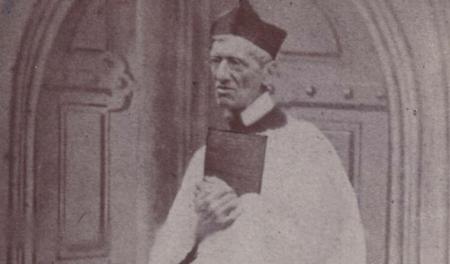Newman's true idea of a university
John Henry Newman's masterpiece on education, "The Idea of a University," is one of those books which is frequently cited but rarely studied. Few persons know the two main arguments of the book: first, that, since a university purports to teach universal knowledge, no institution which lacks systematic instruction in sound theology, can claim to be a genuine university; second, that the cultivation of the beauty of the intellect, that is, of "intellectual virtue," is an intelligible and important goal, which should be the main purpose of a university.
Catholic parents must as a whole be ignorant of these arguments, or unimpressed by them -- even though advanced by a monumental thinker and a recent Beatus, much beloved by recent, saintly popes -- because Catholic preferences for higher education ("Ivy League universities are great;" "You should attend college to get a job") seem exactly opposite to Newman's recommendations.
Even those familiar with the "Idea" seem not to appreciate correctly its significance and weight. "The book consists of lectures Newman gave explaining his plan for a new Catholic university in Ireland." Actually, no: only the first few lectures (those putting forward the two arguments I mentioned) were meant to occupy that sort of foundational role. The bulk of the book consists of occasional addresses on various special topics. These lectures and addresses were not assembled into a single volume until 1873, 20 years after Newman's attempt to found a university.
So a reader is exposed to error, if he approaches the "Idea" with the expectation of finding something like a complete blueprint for a Catholic university. Here is an example. In the Preface, Newman in a famous passage writes: a university "is a place of teaching universal knowledge. This implies that its object is, on the one hand, intellectual, not moral; and, on the other, that it is the diffusion and extension of knowledge rather than the advancement. If its object were scientific and philosophical discovery, I do not see why a University should have students; if religious training, I do not see how it can be the seat of literature and science."
Supposing this statement to express Newman's complete conception, readers have commonly inferred -- correctly -- that for Newman teaching has priority over research in a university, but also -- quite incorrectly -- that "religious training," pastoral ministry, and faith generally have no place in a university, or, if so, an incidental role at best.
By an "incidental" role I have in mind the Land O' Lakes model, embraced decades ago by the most prestigious Catholic universities in our country, which says that professors are supposed to be dedicated to their academic work solely, and need not even be believers, and that pastoral ministry takes place, as it were, on the fringes of the university, through the efforts of priests and non-faculty. On this view, it is perfectly okay if a Catholic university amounts to no more than, in the apt words of Notre Dame philosopher Fred Freddoso, "a secular university in a Catholic neighborhood."
Already one might have seen that this latter inference was mistaken by looking at Newman's sermons which touch upon education. Consider his "Intellect, the Instrument of Religious Training," one of the great "Sermons on Various Occasions." Newman first argues there that the intellectual and moral powers, meant to be harmonious in us, are now often at war with each other as a result of original sin, "as, when a kingdom has long been in a state of tumult, sedition, or rebellion, certain portions break off from the whole and from the central government, and set up for themselves." Newman next proposes: "Here, then, I conceive, is the object of the Holy See and the Catholic Church in setting up Universities; it is to reunite things which were in the beginning joined together by God, and have been put asunder by man."
But achieving that goal requires a faculty consisting of believing professors, who combine faith and reason in themselves: "Some persons will say that I am thinking of confining, distorting, and stunting the growth of the intellect by ecclesiastical supervision. I have no such thought. Nor have I any thought of a compromise, as if religion must give up something, and science something. I wish the intellect to range with the utmost freedom, and religion to enjoy an equal freedom; but what I am stipulating for is, that they should be found in one and the same place, and exemplified in the same persons. I want to destroy that diversity of centres, which puts everything into confusion by creating a contrariety of influences. I wish the same spots and the same individuals to be at once oracles of philosophy and shrines of devotion."
The notion that compromises must be made, usually of religion in favor of secular prestige, seems exactly the approach of the Land O' Lakes universities, and the phrase, "puts everything into confusion" seems to capture perfectly the quality of the Catholic education which results.
Now that sermon was actually preached in 1856 in the University Church, Dublin, when Newman was rector. Obviously, there is nothing incidental about "religious training" in his idea of a university found there: if you have doubts, look again at the title of the sermon.
So where can we go to find Newman's more complete "idea"? Every Catholic professor, administrator, and university president should ask this question. I will tell you next month.
MICHAEL PAKALUK IS A PROFESSOR OF PHILOSOPHY AT AVE MARIA UNIVERSITY.
- Michael Pakaluk is Professor of Ethics and Social Philosophy in the Busch School of Business at The Catholic University of America. His book on the gospel of Mark, ‘‘The Memoirs of St. Peter,’’ is available from Regnery Gateway.



















